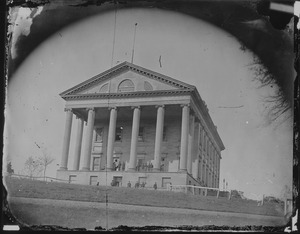Jonathan C. Gibson facts for kids
Quick facts for kids
Jonathan Catlett Gibson, Jr.
|
|
|---|---|
| Member of the Virginia House of Delegates from the Culpeper County district |
|
| In office December 4, 1879 – December 6, 1881 |
|
| Preceded by | James Barbour |
| Succeeded by | Jacob S. Eggborn |
| Member of the Virginia House of Delegates from the Culpeper County district |
|
| In office December 5, 1883 – December , 1894 |
|
| Preceded by | Jacob S. Eggborn |
| Personal details | |
| Born | 1833 Culpeper County, Virginia, U.S. |
| Alma mater | University of Virginia |
| Occupation | Lawyer, farmer |
| Military service | |
| Allegiance | |
| Branch/service | |
| Years of service | 1861-1865 |
| Rank | |
| Unit | 49th Virginia Infantry |
Jonathan Catlett Gibson, Jr. (born in 1833) was an important person in Virginia during the 1800s. He was a lawyer and a farmer. He also served as a soldier for the Confederate States Army during the American Civil War. After the war, he became a politician. He represented Fauquier County at a special meeting called the Virginia Constitutional Convention of 1868. Later, he represented Culpeper County in the Virginia House of Delegates, which is part of Virginia's state government.
Contents
Early Life and Education
Jonathan Catlett Gibson, Jr. was born in Culpeper County, Virginia in 1833. His father, Jonathan Catlett Gibson, Sr., was also a lawyer. Jonathan Jr. was one of five sons who later fought in the Civil War. His family was wealthy, which meant they could afford to send their sons to private schools.
Even though his father passed away in 1849, Jonathan Jr. continued his education. He attended the University of Virginia from 1850 to 1851. Like his father, Jonathan Jr. married twice. He married Mary Georgia Shackelford in 1870 and Florence Eastham Daniel in 1901.
Career and Public Service

Jonathan Gibson, Jr. started his career as a farmer in Fauquier County, Virginia. He also practiced law in Culpeper and nearby counties.
Service During the Civil War
When the American Civil War began in 1861, Gibson joined the Confederate Army. He helped create an infantry company called the "Sperryville Rifles." He became the captain of this group. His brother, Eustace, also served with him.
The Sperryville Rifles later became Company K of the 49th Virginia Infantry. Jonathan Gibson, Jr. was promoted several times, becoming a major, then a lieutenant colonel, and finally a colonel. He was known for his bravery and was reportedly wounded many times during the war. His brothers also served in the war. Sadly, his older brother, William, died in battle.
Post-War Life and Politics
After the Civil War ended in 1865, Gibson returned to his life as a farmer and lawyer. Some of his brothers moved to other parts of Virginia and West Virginia. His brother Eustace even became a politician in West Virginia.
In 1867, the people of Fauquier County elected Jonathan Gibson, Jr. to attend the Virginia Constitutional Convention of 1868. This was a very important meeting where leaders discussed how to rebuild Virginia after the war and create new laws. He was one of two delegates from his area.
By 1870, Gibson was living in Catalpa, a historic home in Culpeper County. The people of Culpeper County then elected him to represent them in the Virginia House of Delegates. He served in this role for several terms, starting in 1879. He was re-elected multiple times, serving until at least 1894.
Death
Jonathan Catlett Gibson, Jr. passed away on Tuesday, January 29, 1907.
 | Delilah Pierce |
 | Gordon Parks |
 | Augusta Savage |
 | Charles Ethan Porter |

